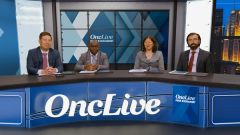
Dr. Bewersdorf on the Role of Allogeneic Transplant in Myelofibrosis
Jan Philipp Bewersdorf, MD, discusses the role of allogeneic hematopoietic cell transplant in myelofibrosis.
Episodes in this series

Jan Philipp Bewersdorf, MD, hospital resident, Yale University School of Medicine, discusses the role of allogeneic hematopoietic cell transplant (allo-HCT) in myelofibrosis.
During the 2021 ASCO Annual Meeting, findings from a systematic review and meta-analysis of 43 studies of 8739 patients with myelofibrosis who underwent allo-HCT were presented. The analysis reported an overall survival rate of 66.7% at 1 year, 64.4% at 2 years, and 55% at 5 years.
Although the study evaluated a wide spectrum of patients with myelofibrosis who underwent allo-HCT, the analysis was not a randomized clinical trial, says Bewersdorf. Moreover, selection bias limits which patients are eligible to proceed to transplant compared with those who are ineligible because of comorbidities or fitness, Bewersdorf explains.
In this analysis, the majority of patients had higher-risk disease with Dynamic International Prognostic Scoring System scores of intermediate 2 or high-risk myelofibrosis, Bewersdorf says. The study confirmed that allo-HCT should be considered for this patient population after careful patient selection, concludes Bewersdorf.

































































